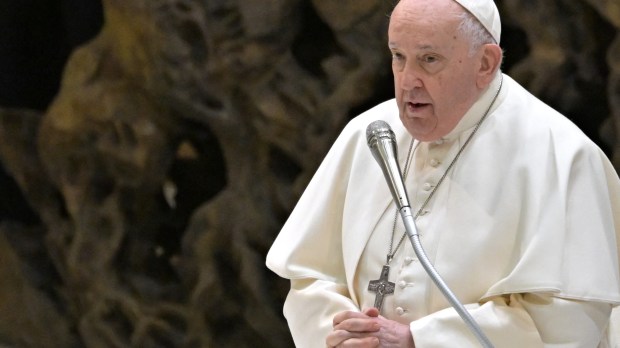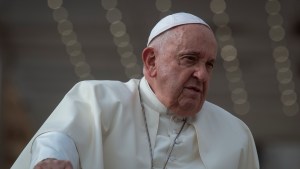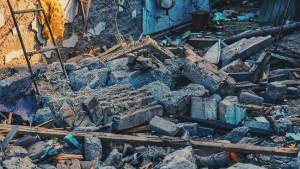“Our world is witnessing a growing number of conflicts that are slowly turning what I have often called ‘a third world war fought piecemeal’ into a genuine global conflict,” Pope Francis warned on January 8, 2024, in his annual address to the diplomatic corps accredited to the Holy See.
Before diplomats representing the more than 180 nations with which the Holy See has official relations, the Pope begged for peace.
“Peace is primarily a gift of God, for it is he who has left us his peace (cf. Jn 14:27). Yet it is also a responsibility incumbent upon all of us,” the Pope said. “We find an increasingly lacerated world, but even more, millions of persons – men, women, fathers, mothers, children – whose faces are for the most part unknown to us, and frequently overlooked.”
At this moment in history where peace “is increasingly threatened, weakened, and in part lost” it is “the responsibility of the Holy See within the international community to be a prophetic voice and to appeal to consciences,” he explained.
In the Vatican’s Hall of Blessings, Pope Francis gave a long speech to the representatives of the 184 states that have diplomatic relations with the Holy See, where he listed the challenges that will be facing the international community in 2024.
Deploring the loss of life from conflict, the Pope highlighted especially the effects of the wars in Gaza and Ukraine but also reminded of conflicts in other areas of the world such as in Asia or Africa.
Civilians are not just “collateral damage”
The Pope especially underlined the enormous loss of innocent life that results from modern warfare and reiterated the need for disarmament. “The distinction between military and civil objectives is no longer respected” thus leading conflicts to “indiscriminately striking the civilian population,” the Pope said, citing the conflicts in Ukraine and Gaza as “clear proof.”
“There is a need for greater effort on the part of the international community to defend and implement humanitarian law.”
“Civilian victims are not ‘collateral damage,’ but men and woman, with names and surnames, who lose their lives,” the Pontiff insisted. War is “nothing other than an immense tragedy, a ‘useless slaughter,’ one that offends the dignity of every person on this earth.”
War is “nothing other than an immense tragedy, a ‘useless slaughter,’ one that offends the dignity of every person on this earth.”
“Wars, nonetheless, are able to continue thanks to the enormous stock of available weapons,” Francis said, explaining that their availability increases their use and production and “creates mistrust and diverts resources.”
“How many lives could be saved with the resources that today are misdirected to weaponry?,” he asked, citing hunger or environmental, economic, and health crises.
“There is need to pursue a policy of disarmament, since it is illusory to think that weapons have deterrent value,” he added. Criticizing nuclear arsenals and “the development of increasingly sophisticated and destructive devices,” the Pope called for a resumption of the negotiations on the Joint Comprehensive Plan of Action, a 2015 agreement, also known as the Iran Nuclear Deal, that restricted Iran’s nuclear program.
Holy Land, Syria, Lebanon
The Argentinian pope went on to list a number of ongoing conflicts, and began by once again expressing his “deep concern” regarding the current situation in the Holy Land. He reiterated the Holy See’s “condemnation” of the October 7 attack and “of every instance of terrorism and extremism.”
However, he also stressed the consequences of the “strong Israeli military response in Gaza,” which has caused “inconceivable suffering” and killed tens of thousands of civilians, including children.
The Pontiff also highlighted the “particular concern” of “the rise in acts of anti-Semitism” around the world in recent months and called for this “scourge” to be “eliminated from society.”
The head of the Catholic Church renewed his call for a “cease-fire on every front,” including on the Lebanese border. He also appealed for the “immediate liberation of all the hostages” in Gaza, for humanitarian aid to be sent to the Palestinian people, and for schools, hospitals, and places of worship to be protected.
He once again defended “the solution of two states, one Israeli and one Palestinian,” with a special international status for Jerusalem, “so that Israelis and Palestinians may finally live in peace and security.”
The Pope then spoke of neighboring countries destabilized by conflict, starting with Syria, which was also hit by an earthquake last February; he called for an end to international sanctions. He then cited Lebanon, with its massive influx of Syrian migrants, its worsening economic and social situation, and above all “the institutional stalemate that has even further burdened them.” The Pope hoped it would be resolved with “the Land of Cedars” having a president soon.
Ukraine, South Caucasus, and Africa
The Pope then moved to other geographical areas, deploring the “nearly two years of large-scale war waged by the Russian Federation against Ukraine.”
“One cannot allow the persistence of a conflict that continues to metastasize,” he said. “It is necessary to put an end to the present tragedy through negotiations, in respect for international law.”
The Bishop of Rome then turned his attention to the conflict between Azerbaijan and Armenia, urging the parties to sign a peace treaty to address the “dramatic humanitarian situation” affecting the region’s inhabitants. He called for the “the return of refugees to their own homes in legality and security” and for the respect of places of worship.
The Pontiff then spoke of the new humanitarian and political crises affecting Africa, citing Sudan, South Sudan, the Democratic Republic of Congo, Mozambique, and Cameroon. He also called for implementation of the November 2022 Pretoria Accord to resolve the conflict that has been tearing Ethiopia’s Tigray region apart for the past decade.
Asia and South America
Continuing his overview of the international security situation, Pope Francis once again warned of the situation in Myanmar, and particularly that concerning the Rohingya minority. He also highlighted the border tensions between Venezuela and Guyana in recent months, and the democratic instability in Peru.
Lastly the Pontiff decried the political situation in Nicaragua, where the government is in open conflict with the Catholic Church, as “troubling.” He underlined the “painful consequences” that this situation is having on the Church. Although the Nicaraguan government has dismissed the apostolic nuncio, the Pope encouraged the continuation of a “respectful diplomatic dialogue.”
Despite these dire situations, in his speech the Pope also highlighted the diplomatic progress made by the world’s smallest state in 2023 as it established diplomatic relations with Oman, it appointed a papal representative in Vietnam, and ratified a supplementary agreement with Kazakhstan.
Migration, climate change, and technological advancement
The Pope also highlighted how the world’s conflicts, along with economic instability and natural disasters, force people to flee their homes leading to migration crises across the world. He cited dangerous routes in the Sahara, in South America, “but above all” through the Mediterranean Sea.
For the Pontiff, the solution to these wars and crises across the world lies in a strengthened multilateralism. He in fact cited the United Nations COP28 meeting on climate change as an “encouraging step forward” to address environmental issues and renew international cooperation.
In his speech the Pope also deplored that “an increasing number of countries are adopting models of centralized control over religious freedom, especially by the massive use of technology.” He underlined that more than 360 million Christians experience high levels of discrimination around the world, including in “traditionally Christian lands.”
Citing his 2024 World Message for Peace, the Pope also reminded of the “centrality of the human person” in technological development, especially artificial intelligence.
The Pope concluded his speech by remembering the 2025 Jubilee, which will begin in December 2024. “For everyone – Christians and non-Christians – the Jubilee can be a time when swords are beaten into ploughshares, a time when one nation will no longer lift up sword against another, nor learn war any more,” he said.



